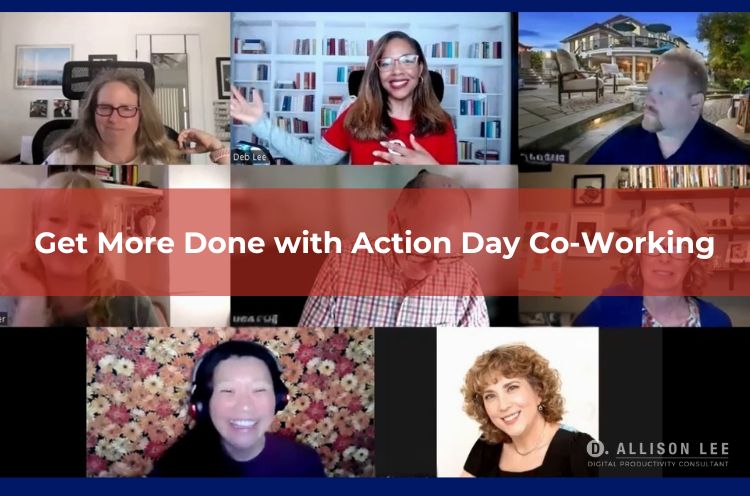Being productive when you don’t feel like it? Yeah, that’s tricky. You're not always going…

7 Super Simple Ways to Stop Procrastinating
Do you procrastinate? A little bit? A lot? There are some who say procrastination can be helpful and others who say that it is so bad that you really should kick the habit pronto.
No matter what side of the fence you’re on, there will be times when you simply must start working on your MIPs or MITs — your most important projects or tasks. Perhaps the due date is looming and you have to get your butt in gear. Or, maybe you just don’t like the massive adrenaline rush your feel when you’re up against a tight deadline.
If this sounds like you or someone you know, keep reading to learn about seven super simple ways you can force, er, encourage yourself to take even the smallest of baby steps to just get started.
Procrastinating? Once you start, you'll get into a groove. So, jump in. Head first. Share on XProcrastination Fix: 7 Ways to Get Started
1. Map it out
Are you overwhelmed and not sure where to start? Begin by looking at all the moving parts and the specific things you’re responsible for.
Then, create a plan. Though you may not be actively working on your tasks (yet), by mapping out a plan, you can:
- Reduce feelings of overwhelm
- Gain a sense of control
- Set a productive mindset in motion
- Pick the ONE thing you’ll start with
If you still feel a little uncertain, jump down to number five to help you get on track and closer to getting things done or at least started.
2. Pick ONE thing
In order to pick your one thing, it will help if you look at your project as a series of mini-projects — smaller tasks that, when completed, help you cross the finish line. So, as you look at your project, cut it down to size so that it’s more manageable and less daunting.
Now, don’t be tempted to go down multitasking lane. Once you pick your one thing, stick with it. Resist the urge to work on another part of the project at the same time. If you get a brain spark about something related to what you’re working on, write it down and follow up on it later (Evernote can help).
Oh, and don’t allow any perfectionist tendencies to sneak up on you either. The perfectionist voice in your head can stall your progress with your one thing and make you second guess yourself.
Go with your beta version and then refresh it later. Tech companies do it all the time. You can, too.
3. Put it on your calendar
Okay, friend, it’s time to get serious about not letting procrastination get the best of you. When something is important to you, you make time for it, right? You schedule it which means you put it on your calendar.
Block out that time to focus on your important tasks and do not use that scheduled time for anything else.
Be realistic about how much time you have to work on your tasks. You’ll set yourself up for failure if you overestimate how much you can actually accomplish each day.
Procrastination from Johnny Kelly on Vimeo
4 . Work in micro-bursts
Just because you put it on your calendar doesn’t mean that you have to work for hours and hours at a time. Sometimes you can very productive when you work for short periods of time. 10 minutes here, 15 minutes there — it all adds up.
Use the Pomodoro Technique (there are several Pomodoro timer apps, too) to help you work for short blocks of time — 25 minutes to be exact. It’s a rigid strategy that doesn’t allow for any interruptions (or else you will have to start over), but it can work extremely well.
I like to use the Pomodoro Technique when I need to write blog posts. It works like a charm! Give it a try to see how it might help you.
Related Reading:
Productivity by the Numbers: How to Prioritize, Focus, and Get Things Done
5. Do something every day
So, remember when I told you to block out time on your calendar for the project you’ve been putting off? Well, I should have clarified that you need to put it on your calendar every day. Yes, every day.
On one day, you might work on your project for 5 minutes and perhaps 60 minutes on another day. But, one thing is for sure, if you work on it every day, you will get it done. And, that’s the end result you want.
7 Super Simple Ways to Stop Procrastinating #productivity Share on XRelated Reading:
6. Phone a friend (or your accountability partner)
Stuck? Fallen off track? Phone a friend to help push that urge to procrastinate aside. Try calling someone who:
- Motivates you
- Helps you thinks through
- Is great at breaking things down
Another helpful person to call is someone who understands your project and your role. That could be a colleague or project lead.
(Psst! You can also reach out to me!)
7. Get over yourself
When all else fails, it will become painfully clear that it’s time to get over yourself and just start. Yes, I said it. Get over yourself. Stop making excuses and doing everything except what you should be doing.
No whining. No complaining. Just prepare yourself to get on with it. Roll up your sleeves. Put on your favorite tunes. Grab a cup of java (or tea or water) and a healthy, energizing snack. Maybe meditate to get yourself in the right mindset to stop procrastination in its tracks. Basically, do whatever it takes to get on with it.
You know that once you start, you’re likely to be motivated and get into a groove. The first hurdle is starting. So, jump in. Head first. Start. Okay, ready? GO!
Final Word
Procrastination still got you down? There may be a way to use it to your advantage. Watch the video below to hear how James Altucher (author and podcaster) uses procrastination to help him be more productive.




Hey Deb, some great tips!
I’ve found the pomodoro technique to be surprisingly effective at beating procrastination. I find it helps me focus on the process instead of the outcome. Whenever I’m too concerned about getting to the outcome I get overwhelmed and procrastinate.
My motto is: Focus on the process and judge yourself on effort..
Love the focus on process and the next step. Do you use Pomodoro for specific tasks or just those that you’re putting off?
All good, Deb… sometimes we need to go at this from multiple directions, especially if it is a long-term habit. Great image too:)
Yep. Sometimes a tactic works and then the next time you use it, it doesn’t. Good to have a few options in your bag of tricks. Thanks for stopping by, Seana. =)
Great tips all around, Deb. I love your emphasis on scheduling your tasks. I like that expression: a to-do not tied to a to-when rarely gets done!
I love that quote! Very, very true. =)
Oh boy Deb I needed to read this today. Over the weekend I became mentally stuck. Today I think I have managed to find every excuse to avoid getting back on track (as you can tell because I am reading blogs instead of working). Your blog gave me the swift kick that I needed to reassess. Thank you.
Yay! So glad that it helped, Sherri. Sometimes, you just need a little nudge — even if it’s a virtual one. =)
Love the “just do it” and the “get over yourself” ideas. Procrastination can be a major blocker…often based in perfectionistic tendencies. There can be other reasons too. I’m pretty good at doing and getting activated. However, when I’m tired, it’s so much harder. So another one I’d add to your list is to get enough sleep.
You’re so right, Linda – sleep is super important. If you don’t get enough Zzzz’s, your motivation will be in the floor and it will be very easy to procrastinate.
I enjoyed this post previously and loved rereading it. This time what resonated was the part about just beginning and that putting you in the groove to do more. So often we psyche ourselves out and make things seem more challenging than they are. Putting an ounce of trust in yourself to start can often be enough to motivate you further. That “thing” you procrastinated about wasn’t so difficult after all.
“That “thing” you procrastinated about wasn’t so difficult after all.” <-- THIS! And, I speak from personal experience. LOL
Thanks for the pep talk, Deb! I hadn’t seen that video before — love it! I can be very productive on other things while procrastinating on something important. When I recognize that’s what I’m doing, it gives me a chance to ask myself why — Do I need to break the project down into smaller, more do-able tasks? Is there something I’m not understanding and do I need to ask for help (or delegate)? Do I need to pick a better time of day to work on it? Do I really need to do the project at all? (Is it still as important as when I started it, or put it on my to-do list?) I, too, think that scheduling the time is key.
Congrats on your first viewing of that video! ???? I have procrastinated by watching it a few times. LOL It’s sort of like a pep talk/nudge to get me moving.
I love that you talk yourself through the procrastination moment. It can help to know why you’re procrastinating in the first place. As always, I’m glad you stopped by. ????